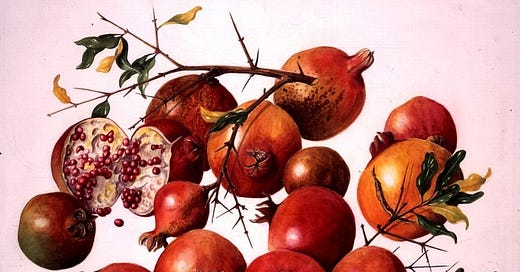Put your hand here on my heart
Treat yourself to a pomegranate and two poems—one by me, one by Pablo Neruda. You can tell which is which.
The pomegranate is a holy and ancient and perfect fruit and anyone who says otherwise doesn’t want what’s best for you.
Pomegranates are, botanically, a berry, and in every way beautiful. The Quran names them God’s good creation. Persephone traveled to hell for them. They wear a crown and in nearly every culture that loves them—which is pretty much all of them, the pomegranate will grow in most climates—they are thought to be blessed and heavenly, to bring fertility and healing, abundance and light. We tend to say we eat the seeds, which some of us do, but only because what we actually eat are the arils. The seeds are inside. Some people spit them out, but I don’t.
I have loved pomegranates all my life. Soon they’ll be out of season.
So you’re going to want to go get a pomegranate.
Take care to choose your fruit. It’s not always true but in this case it is: the bigger the better. You want a weighty jumbo.
Generally you want to avoid bruises. I, personally, could not. I did the best I could with what I was given, and I couldn’t ask for more.
You will take your paring knife and be reasonable. You will be patient and methodical and calm, because that and a few minutes is all it takes.
Some people say the best way to get the fruit from the pomegranate is to slice it open and beat the shit out of it with a wooden spoon. But I don’t brutalize my fruit and you don’t have to either. Shortcuts will get the juice faster, it’s true. But you’ll miss how well-made the fruit is. Maybe that matters to you, or it doesn’t, maybe you just want your berries.
We all have to make our own choices.
If you’re me, which I am, you use your sharp knife to firmly score a hexagon about the crown. A pentagon is fine too. Then you grab the crown by its points and gently, working side to side, pop that top off. Now you can see inside the pomegranate, which you notice is lovely, and in some ways not unlike a space egg or a starfish.
And you see how the fruit is naturally divided into 5 to 7 cells, and how the ridges along the outside rind define the contours of each cell.
So you take your knife and again, firmly score the fruit down the side of each ridge. Then you put down your knife and use your bare hands. You grip the fruit but respectfully, and with just enough pressure, coax it apart in your hands.
Now you have five or seven or—if things got a little sloppy, which happens sometimes—four sections of pomegranate, wine-red fruit held delicately together by spongey pith, which not everyone will tell you is also edible, but I will. I don’t eat it though.
One section at a time, working over a bowl, you brush your thumbs over the arils to release them from their pith. Again, not too much pressure but just enough, which is often less than you think.
And now you have a snack that reminds you of your mother, also cake, mythology, and Pablo Neruda. It is full of vitamins and memories. You will probably write a poem about it.
In the meantime, here. Have these.
from The Book of Questions
Pablo Neruda
And what did the rubies say
standing before the juice of pomegranates?
Why doesn't Thursday talk itself
into coming after Friday?
Who shouted with glee
when the color blue was born?
Why does the earth grieve
when the violets appear?
Why on earth we’re dancing
We are alivelivingbreathingandloving with linen, pears
and pomegranates, lavender and rhyolite, imagine
for a moment how the wind would sing if it sang,
but it does. Take a moment instead to close your eyes
and bring yourself to simmer, yes, the good soft mud
of a good soft lake, a mountain, a wonderful mountain
beloved. The sun when the clouds burn off? An old word
spoken just so, beloved. Oh let me feed you ten thousand poems
from the pockets (the pockets!) of this good soft frock,
there’s room enough in here for us both and our ancestors,
not to mention cotton on skin drapes the body
like a prayer I forgot I remember and friends,
wherever I go they grow. Put your hand here
on my heart like this before it goes to seed.
Let your longing be divine. Believe me who believes
in the god of your voice, a holy and honey-dipped ingress
to grace, you will have what you sing into being and trees
(have you heard?) can make their own weather.
originally published in Understory
Okay. Go find a pomegranate.












I was going through my list of Substack subscriptions this morning and I realized I hadn't seen anything from yours in a little while. Literally seconds later, this popped into my inbox...
There is something about your posts that just draw me in, and this one is no different. You turn the simple act of cutting a pomegranate into poetry. (And at the end, almost literally!) Your mention of Persephone is timely as well -- been doing a lot of research about her world for many reasons. You've given me another avenue to pursue.
Haven't seen a pomagranate in a long time, though I haven't really been looking (and I get laser-focused in grocery stores -- in and out, nobody gets hurt). But I *will* look for one, next time I'm there.
Happy Sunday!
~Graham
I love your poem! And I share your deep awe and love for the pomegranate!